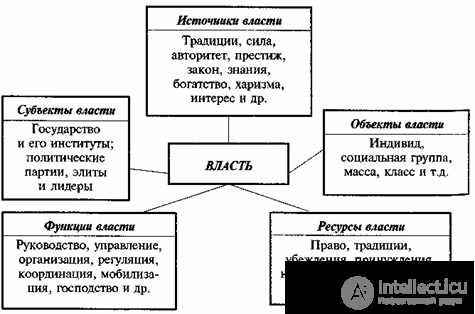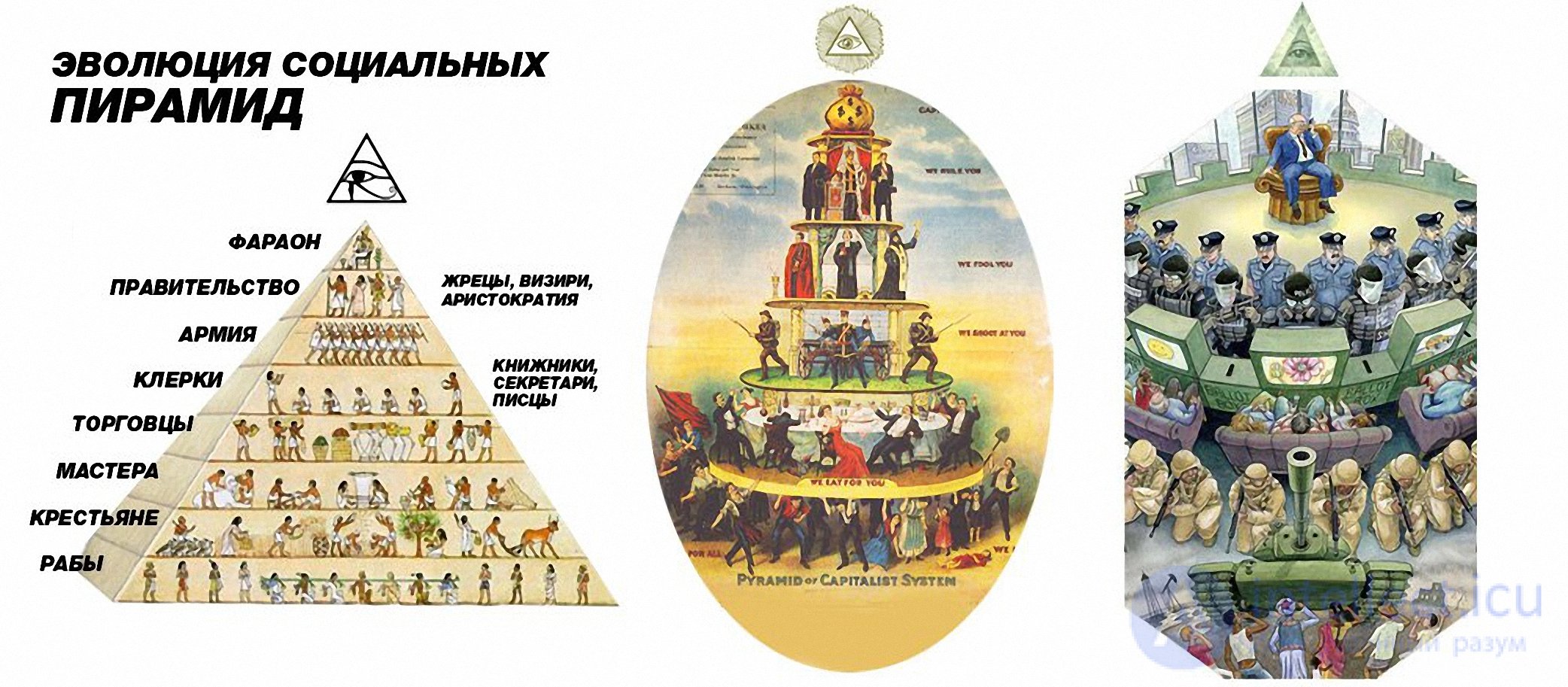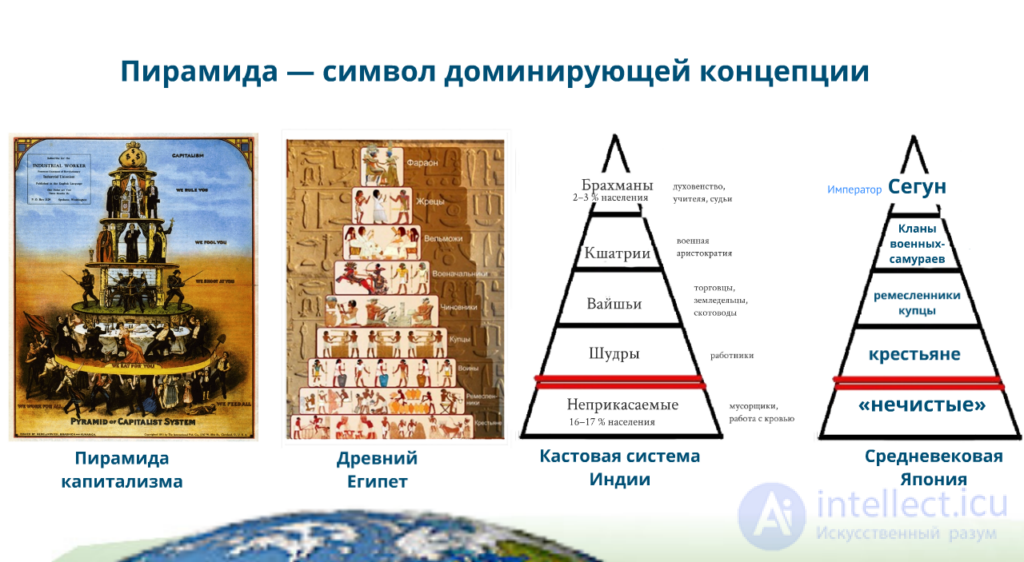Lecture
The main components of power are:

The subject of power embodies its active guiding principle. It can be an individual, an organization, a community of people, for example, a people or even a world community united in the UN.
For the emergence of power relations it is necessary that the subject has a number of qualities. First of all, it is the desire to rule, manifested in orders or orders. Most people do not experience the psychological pleasure of owning power, power in itself is not a value for them, many in general would prefer to shy away from managerial positions and related psychological and social responsibility if the power did not open wide opportunities for obtaining various kinds of benefits. For them, the desire for power is instrumental, i.e. serves as a means of achieving other goals.
In addition to the desire to lead and the willingness to assume the responsibility associated with it, the subject of power must be competent, know the essence of the matter, the state and mood of subordinates, be able to use resources, and have authority. Of course, in real life, the powers that be are endowed with all the above qualities to varying degrees.
The subjects of political power are complex, multi-level in nature: its primary factors are individuals, the secondary are political organizations, the subjects of the highest level, directly representing various social groups and the whole people in all relations of power - political elites and leaders. The connection between these levels can be broken, leaders often break away from the masses and even from the parties that brought them to power.
A reflection of the paramount role of the subject in the relationship of power is the widespread identification of power with its carrier. So, they talk about the decisions of the authorities, about the actions of the authorities, etc., implying the governing bodies under the authority.
The subject determines the content of the power relationship through the order (order, command). The order prescribes the behavior of the object of power, indicates (or implies) sanctions that entail the execution or failure to comply with this order. From the order, the nature of the requirements contained in it depends largely on the attitude to it of the object, the performers - the second most important element of power.
Power is never the property or attitude of only one actor (body). Power is always bilateral, asymmetric, dominated by the will of the ruler, the interaction of its subject and object . It is impossible without subjecting the object. If there is no such submission, then there is no power, despite the fact that the subject aspiring to it possesses a pronounced will of power and even powerful means of coercion. Ultimately, the object of the will of the power always has an extreme, but still the choice - to perish, but not to submit. Awareness of the dependence of power on the submission of the population has found its practical political expression in actions of civil disobedience, which is widely used throughout the world.
The scale of the relationship of the object to the subject of power extends from fierce resistance to voluntary, perceived with joy obedience. In principle, submission is just as naturally inherent in human society as is leadership. Readiness for submission depends on a number of factors: on the object’s own qualities, on the nature of the demands placed on it, on the situation and the means of influence that the subject has, as well as on how the performer perceives the subject, depending on whether he has authority.
The qualities of the object of government are determined by its political culture. Patriarchal and poddannichesky types of political cultures provide the greatest submission. The predominance in the society of people accustomed to obey, eager for "hard hands", is a favorable breeding ground for authoritarian and totalitarian regimes.
The motivation of submission is quite complicated. It can be based on fear, on the habit of obedience, on the conviction of the need for submission, on authority, on interest in obedience, etc. All these motives affect the power of power.
The power of power based on fear is directly proportional to the severity of the punishment and inversely proportional to the likelihood of avoiding it in case of disobedience. Such power tends to weaken.
Relatively painlessly accepted by people is power based on the habit, the custom of obeying. It was inherent in the state in traditional societies. It is a reliable factor in the stability of power until it comes into conflict with the requirements of real life. If this happens, she quickly collapses as soon as people notice that she has outlived herself, and her representatives are unworthy of obedience.
The most stable is power built on interest. Personal interest encourages subordinates to voluntarily execute orders, makes superfluous control and application of negative sanctions. It contributes to the development of other types of people motivation of submission: on the basis of conviction, authority and identification. Such submission is associated with the motivational influence of rather deep layers of consciousness: mentality, value orientations and attitudes. The conviction of people to submit to the state or another carrier of power for the sake of lofty goals is an important source of power.
One of the most favorable for the power of motivation of submission is authority . It is formed on the basis of the general interest of the object and the subject of power and the conviction of subordinates in the special abilities of the manager. Authority is the highly valued qualities that subordinates confer on a leader and which determine their obedience without the threat of sanctions or persuasion. Authority is based on consent, it means respect for the governing person (institution), trust in it.
Authority can be true when a leader really possesses those qualities that his subordinates confer on him and false, based on delusions. Depending on the qualities that underlie it, authority can be:

Without authority, power cannot be durable and efficient. Power based on interests, conviction and authority often develops into the identification of a subordinate with a leader. In this case, the maximum power of power is achieved, and the subject is perceived by the object as its representative and protector. The subjective identification of performers with a manager can be explained by two reasons:
1) to be a consequence of the real dual situation of people in relation to power, as is the case in democratic organizations, where individuals act as both a subject of power (elect and control leadership), and its object (execute decisions of the governing bodies). In this case, both agents of power coincide, although not completely;
2) to act as a result of common interests and values of the leader and the performer and the emergence of the latter’s sense of unity with the whole organization or group.
The subject and the object characterize the extreme poles, the active principles of the structure of power . Moreover, the very division of people into subjects and objects, chiefs and subordinates is in many respects relative: in one respect a person acts as a chief, and in the other - a subordinate. In relation to the authorities, the interaction of its agents is mediated by a whole complex of means or resources and is carried out within the framework of a special institutional mechanism regulating the process of rule. What are these components of power?
The most important social reason for the subordination of some people to others is the uneven distribution of the resources of power. This term itself is used both in a broad and narrow sense. In a broad sense, the resources of power are everything that an individual or group can use to influence others. Such an understanding of power is quite general and does not allow differentiation of various elements of power: its subject, object, means, since in this case the resources of power include all factors that in one way or another can affect power:

With such a broad understanding of resources, their specificity is lost as a relatively independent, usually materialized link, mediating the interaction of agents of power and serving as the most important social factor of subordination and domination.
Therefore, to study the resources of power and its structure, it is preferable to have a narrower interpretation of the resources of power, their understanding as all those means, the use of which provides influence on the object of power in accordance with the goals of the subject. Resources are either important for the object of value (money, consumer goods, etc.), or means that can affect the inner world, the motivation of a person (television, press, etc.), or tools (instruments) using which can deprive a person of certain values, the highest of which is usually considered life (weapons, punitive organs as a whole).
Resources, along with the subject and object, are one of the most important foundations of power, although sometimes the resources and the foundations of power are identified. They can be used to encourage, punish or persuade.
The primary importance of resources as the basis of power is reflected in the theory of "social exchange". According to this theory, the power is based on the uneven distribution of scarce resources. People who do not have the resources receive them in exchange for executing the orders of the owners of the resources. Thus, they become dependent on others and obey them.
Resources are used as positive (provision of benefits) and negative (deprivation of wealth) sanctions. In the process of their mobilization by the subject, they are transformed into power, which is the ability to turn certain resources into influence in the system of interrelated agents. The resources of power are as diverse as the means to meet the various needs and interests of people. There are several classifications of resources. Some scientists divide them into utilitarian, compulsory and normative.
Utilitarian resources are material and other social benefits associated with the daily interests of people. With their help, the authorities, especially the state, can “buy” not only individual politicians, but also entire sections of the population. These resources are used both for encouragement and for punishment (for example, reducing unfair wages).
As a coercive resource, there are usually administrative penalties used in cases where utilitarian resources do not work. This, for example, is the prosecution of strike participants who were not afraid of economic sanctions.

Regulatory resources include the means of influencing the inner world, value orientations and norms of human behavior. They are designed to convince subordinates of the common interests of the head and executives, to ensure the approval of the actions of the subject of power, the adoption of its requirements. If the first two types of resources are related to the impact on real circumstances and, through them, on people's behavior, then the third type of resources is directly influenced by human consciousness.
It is quite common and fruitful for understanding the specifics of various types of power to divide resources in accordance with the most important spheres of life into economic, social, political-power, and cultural-informational.
Economic resources are the material values necessary for social production and consumption, money as the universal equivalent of the value of the means of production, fertile land, food, etc.
Social resources - the ability to raise or lower social status or rank, a place in social stratification. They often coincide with economic resources. So, for example, income and wealth, being an economic resource, at the same time characterize social status - a social resource. However, social resources include indicators such as position, prestige, education, medical care, social security, etc.
Cultural and information resources - knowledge and information, as well as the means of obtaining and distributing them: institutes of science and education, the media, etc. According to the American sociologist O. Tofler, in the late XX - early XXI centuries. it is knowledge and information that will become the most important resource of power. Already today, in postindustrial countries, knowledge, by virtue of its advantages (infinity, general accessibility, democracy), subdued force and wealth and became the determining factor in the functioning of power. In the course of social development, such traditional resources of power as strength and wealth lose their influence, although they do not disappear completely. True power is acquired by knowledge and information. Of course, by no means in all countries they have priority over economic, social and power resources, but the tendency to increase the importance of cultural and information resources as a source of power is manifested in the modern world quite clearly.
Power resources are weapons and apparatus of physical coercion, specially trained people for this. In the state, their core is the army, the police (militia), special services, internal troops, the court and the prosecutor's office with their real attributes: buildings, equipment, prisons, etc. This type of resources is traditionally considered to be the most effective source of power, since its use can deprive a person of the highest values: life, freedom and property.
Various resources of power are used by its subjects, usually in a complex, especially by large political actors, for example, by a state that uses all the above-mentioned resources to a greater or lesser extent.
The specific resource of power is the man himself - demographic resources . People are a universal, multi-functional resource that creates other resources. A person is a creator of wealth (economic resources), soldiers and party members (political power resources), recipient and distributor of knowledge and information (cultural information resources), etc. Personality is a resource of power only in one of the many dimensions - being used as a means of realizing another's will. In general, a person is not only a resource of power, but also its subject and object.
Thus, we considered: first, the views of philosophers, sociologists and political scientists on the genesis of power; this analysis allows us to draw conclusions that the development of the theory of power and its representation are influenced, first of all, by the objective processes of social development, and then by the subjective ideas of the authors; secondly, the main sources and elements of power. 
Comments
To leave a comment
Political science
Terms: Political science